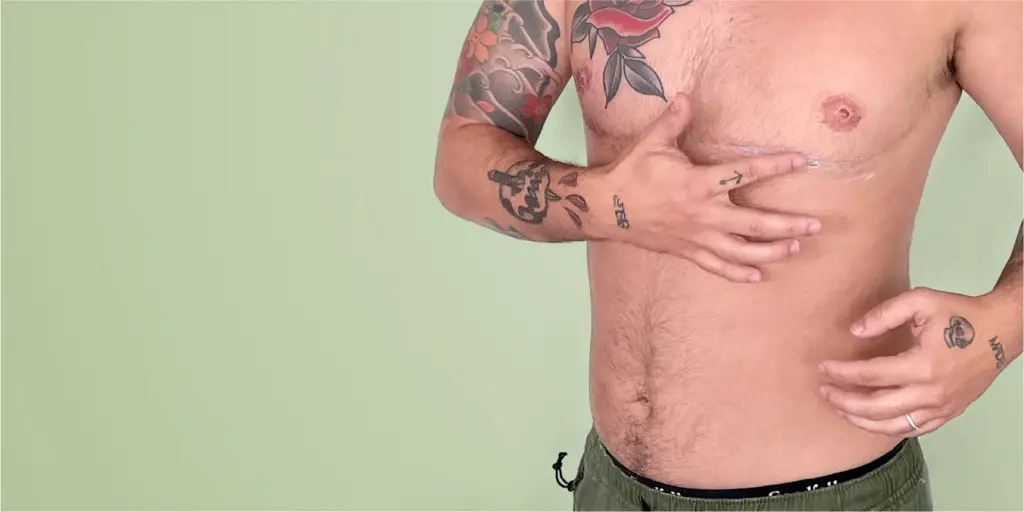Love Your Skin with Smart Scar Care
Congratulations, your surgery is finally on the calendar! Surgery can be exciting, scary, or a mix of both. Many trans people wait months, or even years to finally experience gender-affirming surgery. It takes a lot of planning and preparation. From a letter supporting your surgical goals, to saving money to pay for the procedure, you have plenty of things to think about. As you get ready for this life-changing experience, remember to nourish yourself, too. Taking care of your skin is one of the simplest, most important things you can do to get your body and mind ready for the big day.
Prep for Better Results
Scar care starts long before you go in for surgery. If your skin is healthy and hydrated, you are likely to heal faster and have less dramatic scarring. When you start planning for surgery, make a skin care plan, too. Drink eight glasses of water every day. (Yes, there’s an app for that.) Take a multivitamin, or a dietary supplement that supports skin health. Try to exercise a couple days a week to get your blood flowing and improve your circulation. Even a brisk walk or some resistance exercises should be enough to elevate your heart rate. After a shower, apply lotion to the area of the body to soften your skin. It may sound simple, but those small steps help build skin health. Healthy skin repairs itself faster than skin that is dehydrated and under-nourished.
People with intense gender dysphoria might have difficulty caring for their bodies, pre-surgery. Knowing that the desired procedure is so close—and yet so far—can intensify those feelings. Some people feel like the challenging body part or area doesn’t “deserve” care. They may neglect that body part because they don’t like touching it, thinking about it, or acknowledging it. Surgery may help ease this dysphoria. For some people, caring about this body part or area with intention can be healing. As you put lotion on your body, it may help to release this body part with love. You might try saying to it, “Thank you for being healthy so I can move forward with my life.” Or, “I release you with love and gratitude.” Small affirmations or reminding yourself throughout the day that the surgery you need is on its way can help keep dysphoria at manageable levels.
The Day After Surgery
Post-surgery, your surgeon will give you instructions for how to take care of your skin. You will have sutures or stitches while your skin heals. Follow the doctor’s guidelines. Often, these guidelines say to take a break from showering for several days, not washing the area, and not using topical lotions or creams on the area. After surgery, continue to drink water and take your vitamins. Use baby wipes to clean yourself, since you won’t be able to shower or bathe until the incisions have started to heal. Also, try to sleep as much as possible, since your body will need to rest and rebuild itself. You will need help from another person to change your bandages; this person should be comfortable with wound care and understand the care guidelines.
Many surgeries take over two weeks to heal, and the healing process involves total rest. The first few days are especially challenging, so plan to do nothing. Getting out of bed and driving to the pharmacy or the store will be too difficult. You can set yourself up for success by making sure you have all the supplies you need for post-surgery care before your procedure. Ask your surgeon what kind of antibacterial ointment, bandages, tape, or non-stick pads you should have at home. Some hospitals will send you home with a wound care kit that includes a few days’ worth of bandages. Ask your friend or helper to get more of whatever is in the kit, so you have it on hand. It’s better to have too much, than run out in the middle of a bandage change.
For people undergoing top surgery, you may have to wear a surgical binder over your bandages. If possible, ask to see this binder when you see your surgeon for the final pre-op consultation. Many binders are very thick, stiff, and reinforced with rigid plastic boning. Post-surgery, you will need to wear this binder around the clock while your body heals. Most doctors suggest taking it off only for bandage changes or bathing. Depending on your body type and skin type, the binder can chafe under your arms after a couple days. You can prevent this by lining the binder hem with soft cotton, like a torn-up undershirt or some of your extra bandages. You can also use a thick moisturizer or Vaseline on those areas to protect your skin from getting irritated. This healing phase is uncomfortable, but it will be over soon—and you’ll be able to enjoy your new chest.
The Year After Surgery
Post-surgery, your skin will keep healing. Skin has multiple layers. The top layer is the first to heal. Deeper layers need months or even a year to fully settle. Keep this in mind, especially when you are tempted to try an activity that will stress your skin. Most people can return to light exercise a few weeks after surgery, but always listen to your doctor’s guidance and your own common sense. (Parkour probably isn’t in the cards for a couple of months.)
Your skin will begin to scar as it heals. Scar tissue is incredibly hard and tough. Its color and thickness depends on the amount of melanin you have in your skin, your genetic makeup, and your general health. Be gentle with your post-op body area. Some people find that scar tissue can feel “tight” or binding. You can massage your scars to help yourself feel more comfortable; if you need help, ask a friend. Also, there are licensed massage therapists or physical therapists who specialize in this type of massage. Some people find that tattooing the area helps also, since the repeated needle pricks break up scar tissue and make it feel more flexible and supple. After you’re cleared to exercise by your doctor, gentle stretches will help your skin bounce back.
Although you may be thrilled to show yourself off, be mindful about sun exposure. Scars are very sensitive to the sun and will be darker and more noticeable if they’re not protected with sunscreen. Many doctors suggest keeping the area under wraps for the first year after surgery—shirt on, plus a high-SPF sunscreen, regardless of skin type. This might be challenging, especially if you’ve been looking forward to a shirtless summer. If you can’t resist, a 50+ SPF waterproof sunscreen will help protect your still-healing scars. Also, some people do not care whether their scars are visible, dark, or obvious. Sunscreen is still important to protect your skin tissue while it’s healing.
Scar care is simple but important to getting the results you want from your surgery. You deserve to feel whole and comfortable in your skin. Taking some time to love your body, drink water, and treat your skin right will set you up for better results and a faster recovery. It’s a tiny act you can take today that supports your future self—a good habit, for a happier tomorrow.



